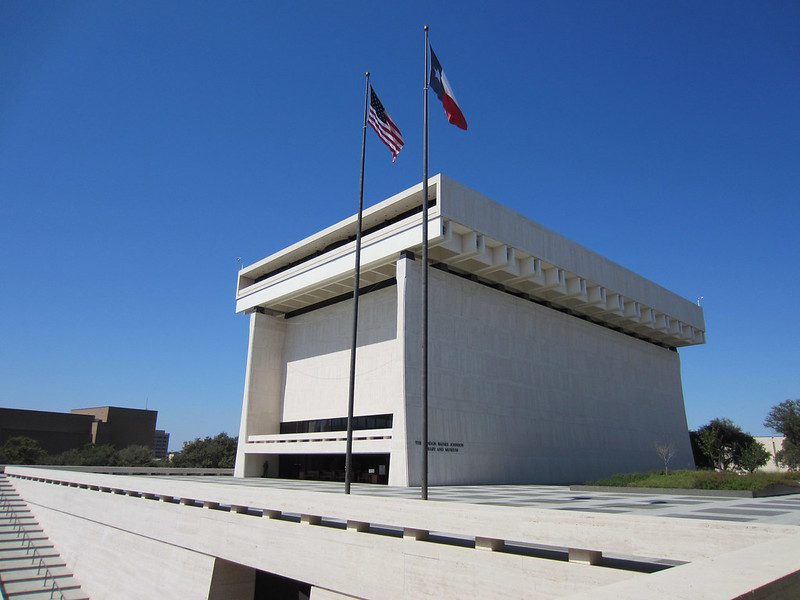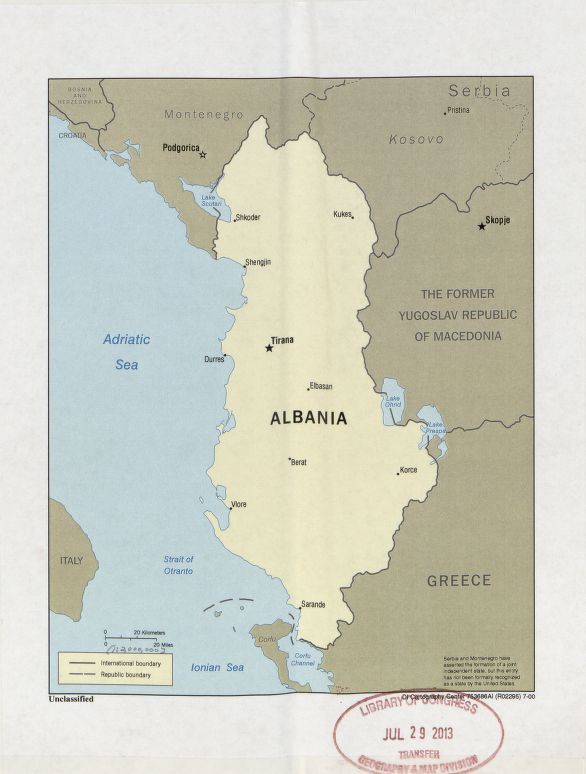Research projects don’t always go as planned. When venturing into the archives, historians are confronted with mountains of documents – boxes upon boxes of government memos, letters, records, etc. Knowing what you want to find can help, but the task of finding is still the proverbial needle in a haystack. This is especially true at the LBJ Library, an archive that contains more than 45 million pages of documents from the political career of President Lyndon Baines Johnson. There are plenty of materials for those interested in the Cold War and the United States’ relations with the Soviet Union and its satellite states in Europe, like Poland and Czechoslovakia. However, other countries, despite being part of the communist bloc, are far more difficult to find in the archive.

LBJ Presidential Library (via Flickr)
Approaching the LBJ archive, I thought it would be interesting to read about Albania since it seems to receive little attention here in the U.S. I duly looked Albania up in the Country Files of the archive and requested the relevant single box of papers. Some countries like Czechoslovakia have documents spread across several boxes, but Albania only merits one. This box arrived at my desk and I was intrigued when I noticed how heavy it was, apparently full of papers. I opened the box and quickly discovered, with a sinking feeling in my stomach, that while the box was indeed quite full with seven folders of documents, there was but a single folder labelled, perhaps optimistically, “Albania, Vol. 1.” Opening the folder I was even more disappointed to discover that it contained a single, two-page (really a page and a half) memo from October 10, 1966, by Nathaniel Davis, with the all-too-appropriate subject line “A Brief Rundown on Albania.”
Feeling a little silly (I had hoped to write a research paper on Cold War Albania), I nonetheless read through the memorandum in the space of a few minutes. Several things struck me as I sat there in the archives. First, the memo consists of mostly unconnected fragments of information. Each paragraph jumps from one topic to another, mostly dealing with Albania’s foreign relations. Second, much of this “information” could be characterized, for lack of a better word, as hearsay or diplomats’ gossip. Nothing came directly from the Albanian government, only through diplomatic backchannels and third-parties. At this point it might be worth mentioning that the U.S. and Albania had no formal diplomatic relations from 1939 (when the country was occupied by Fascist Italy) until the collapse of communist rule in 1991.

Enver Hoxha via Forrásjelölés Hasonló/ Wikimedia Commons
This lack of formal relations probably explains the absence of other documents. However, it is not clear that this was due to an isolationist attitude on the Albanian side. Enver Hoxha, the communist leader of Albania from World War II until his death in 1985, was famously paranoid and ideologically rigid even by Stalin’s standards. Among other things, this paranoia has left a very physical mark on the Albanian countryside in the form of 173,000 concrete pillbox bunkers, for an average of nearly 15 such bunkers per square mile (5.7 per square kilometer). On the other hand, this 1966 memo from the LBJ archive claims that “Albania is casting out some lines toward the West.” For evidence, the memo’s author, Davis, cites Albania’s establishment of relations with Turkey, a series of talks with West Germany, and “vague proposals” to the Austrian government for “coming nearer to the West.” In addition, Davis reports that early in 1966 “an Albanian Vice Foreign Minister asked the Italian ambassador how relations with the U.S. might be established.” The Albanian government was also perturbed that its UN representative had not been invited to President Johnson’s reception for UN delegates.
Given the apparent interest on the Albanian side for formal relations with the U.S. and its European allies, why are there not more documents in the LBJ archive’s Albania folder? It seems that there was little appetite at the U.S. State Department for extending relations. The memo lays out the reasons why various people in the State Department were unenthusiastic about Albania while also dismissing most of them out of hand. In general, the main concern seems to have been the impact that establishing relations with Albania would have on other foreign relationships, particularly regarding the Soviet Union since Albania had recently sided with China in its quarrel with the Soviets. There were also fears of inter-communal violence (between whom exactly is unclear) backed by Albania’s neighbors (namely Greece, Yugoslavia, and Italy), with explicit comparisons to the Greco-Turkish confrontation in Cyprus from 1960 to 1964. The memo also mentions Greek apprehension at the prospect of Albania reaching out across the Iron Curtain, at least in part due to the Albanian decision to side with Turkey over the Cyprus issue.

Map of Albania via Library of Congress Geography and Map Division Washington, D.C.
Far from being isolated and obscure, Albania appears tangled in a web of contentious international relations involving both its neighbors and powers further afield. In fact, it is this very web that prohibited U.S. relations with Albania, for fear of upsetting more than one delicate element of the status quo. Consequently, if paradoxically, Albania is largely absent from LBJ’s files. In other words, just because Albania does not appear among these files, does not necessarily mean that it was doomed to be a hermit on the international stage, holed up in a fortress overlooking the Adriatic and Ionian Seas. Albania’s obscurity in these papers is rather a product of the contentious position it carved out for itself on the world stage.
You might like:
“Stand With Kap”: Athlete Activism at the LBJ Library
Más de 72: Digital Archive Review
History Calling: LBJ and Thurgood Marshall on the Telephone
The views and opinions expressed in this article or video are those of the individual author(s) or presenter(s) and do not necessarily reflect the policy or views of the editors at Not Even Past, the UT Department of History, the University of Texas at Austin, or the UT System Board of Regents. Not Even Past is an online public history magazine rather than a peer-reviewed academic journal. While we make efforts to ensure that factual information in articles was obtained from reliable sources, Not Even Past is not responsible for any errors or omissions.



